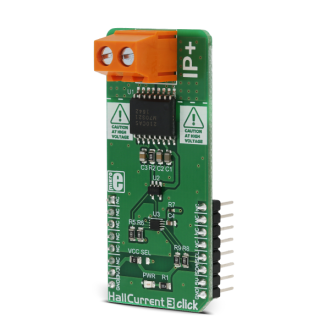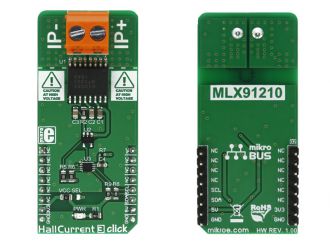
We strongly encourage users to use Package manager for sharing their code on Libstock website, because it boosts your efficiency and leaves the end user with no room for error. [more info]

Rating:
Author: MIKROE
Last Updated: 2018-08-27
Package Version: 1.0.0.0
mikroSDK Library: 1.0.0.0
Category: Current sensor
Downloaded: 4763 times
Not followed.
License: MIT license
Hall current 3 click is a very accurate current measurement Click board, which utilizes the Hall effect to provide a precise and reliable measurement of reasonably high current. Its most distinctive feature is a very low series resistance of only 0.8mΩ, making this device a nearly-perfect ammeter.
Do you want to subscribe in order to receive notifications regarding "HallCurrent 3 click" changes.
Do you want to unsubscribe in order to stop receiving notifications regarding "HallCurrent 3 click" changes.
Do you want to report abuse regarding "HallCurrent 3 click".


Library Description
This library provides basic functionality for reading the current value and controlling the click board.
Key functions:
float hallcurrent3_getCurrent()- Reads current in mAuint16_t hallcurrent3_readData(uint8_t reg) - Reads current dataExample description
The application is composed of three sections :
void applicationTask()
{
Current_data = hallcurrent3_getCurrent();
FloatToStr(Current_data, demoText);
mikrobus_logWrite("Current : ", _LOG_TEXT);
mikrobus_logWrite(demoText, _LOG_TEXT);
mikrobus_logWrite(" mA", _LOG_LINE);
Delay_ms( 1000 );
}
Other MikroElektronika libraries used in the example:
Additional notes and information
Depending on the development board you are using, you may need USB UART click, USB UART 2 click or RS232 click to connect to your PC, for development systems with no UART to USB interface available on the board. The terminal available in all MikroElektronika compilers, or any other terminal application of your choice, can be used to read the message.